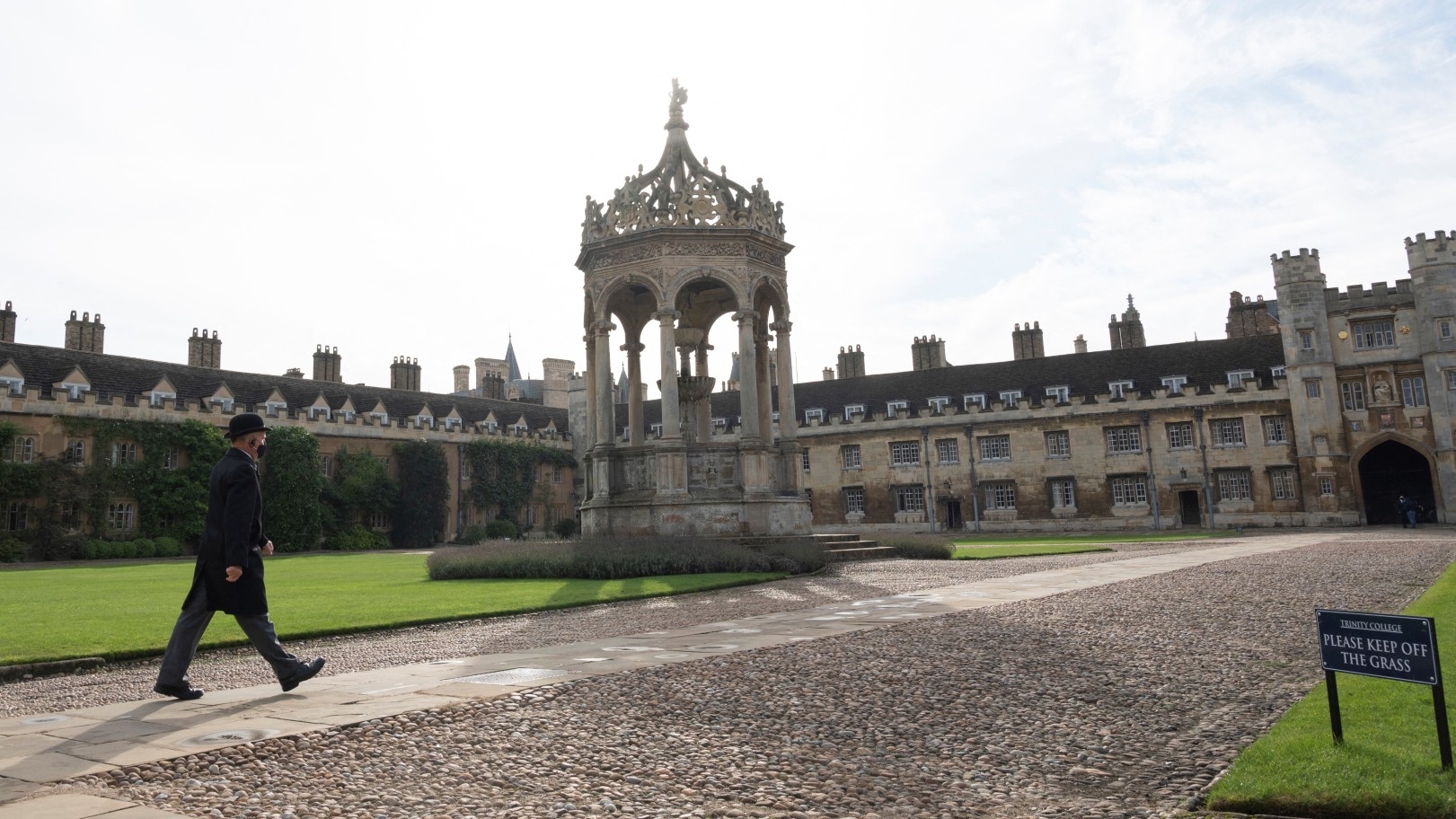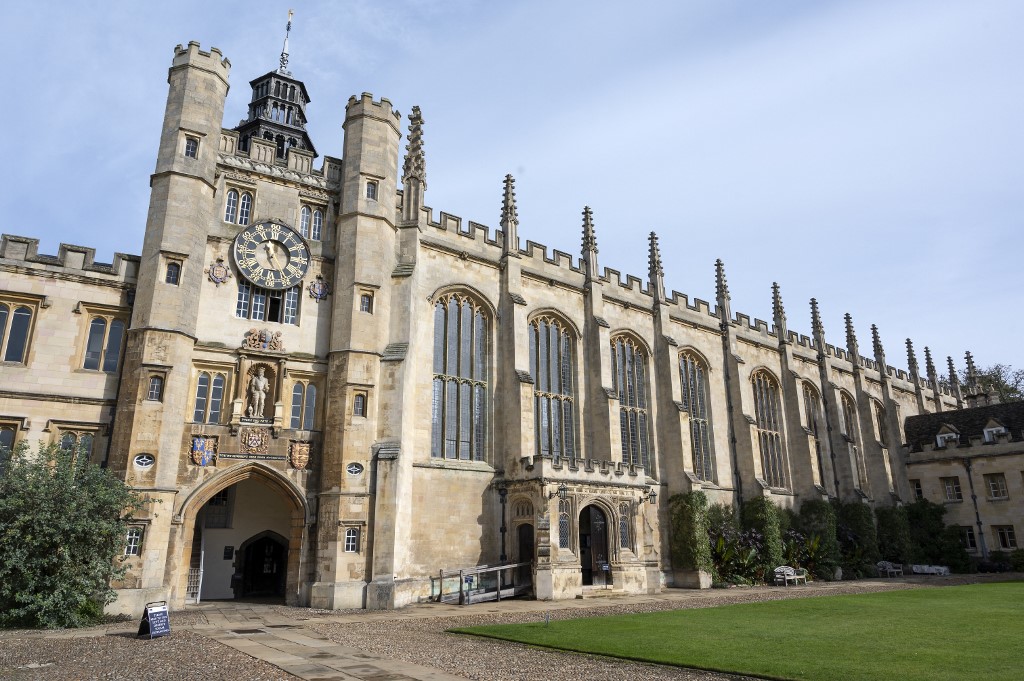Cambridge University investing millions in companies fuelling Israel's war on Gaza

The University of Cambridge's wealthiest college has invested millions of dollars in companies arming, supporting and profiting from Israel's war on Gaza, Middle East Eye can reveal.
Information obtained under the Freedom of Information Act shows that Trinity College, a constituent college of the University of Cambridge, has investments worth millions of dollars in American, British and Japanese companies which are directly involved in Israel's current military offensive in Gaza.
According to the figures, which list investments made until the end of 2023, Trinity has £61,735 ($78,089.84) invested in Israel's largest arms company, Elbit Systems, which produces 85 percent of the drones and land-based equipment used by the Israeli army.
Elbit, which is traded on both the Israeli stock exchange and the US Nasdaq, has faced renewed criticism over its drones being used in military operations in the besieged enclave.
Japanese trading giant Itochu cut ties with Elbit earlier this month in response to an International Court of Justice (ICJ) ruling that Israel may be committing genocide in Gaza.
Stay informed with MEE's newsletters
Sign up to get the latest alerts, insights and analysis, starting with Turkey Unpacked
Trinity also has investments worth approximately £2.5m (around $3.2m) in Caterpillar, a US-based heavy equipment company which has long been the target of boycott campaigns for its sale of bulldozers to the Israeli army.
'Beyond belief'
In 2003, Caterpillar triggered outrage when an Israeli soldier used a D9R armoured bulldozer to run over US citizen and pro-Palestine activist Rachel Corrie whilst she was protesting against a home demolition in Gaza.
The Israeli military continues to deploy the company's bulldozers despite continued campaigning against their use by the Corrie family and the firm being dropped from an index of "socially responsible" companies.
Caterpillar also produces components for the illegal separation wall in the occupied West Bank.
Trinity has more than £3.6m (around $4.5m) invested in Japan's Toyota Corp, which sells vehicles to the Israeli military and the Israeli Ministry of Defence.
The United States delivered several Toyota "David" armoured vehicles to Israel in October as part of its military support to the country.
Trinity has also invested approximately £3m (approximately $3.8m) in General Electric, which manufactures engines, mechanical systems and components regularly used by the Israeli military in Gaza.
The college has investments worth around £458,000 ($579,000) in Rolls-Royce, which is involved in the production of the F-35 stealth combat aircraft currently used in Gaza; over £500,000 (around $650,000) in Barclays Bank, which holds over £1bn ($1.2bn) in shares in companies arming the Israeli military; and investments topping £650,000 (over $800,000) in L3Harris Technologies, which is responsible for components integrated into weapons systems used by Israel.
Jonathan Purcell, a senior public affairs and communications officer at the International Centre of Justice for Palestinians (ICJP), said that it was "beyond belief" that Trinity College was investing in companies "complicit in Israel's latest assault on Gaza".
In 2018, the student campaign "Demilitarise Cambridge" found that Cambridge's constituent colleges collectively held over £6.5m (about $8.2m) in arms companies.
Investments are 'incompatible with Trinity's ideals'
Such sentiment was shared by several current and former students who told MEE that they had serious concerns that the college was directly involved in Israel's military industry, illegal settlement industry, and involved in the production of technologies used against Palestinians.
Student Angelica Akrami pressed Trinity, which boasts around £1.5bn in assets, to divest from firms such as Elbit Systems, adding that she felt complicit over "the unspeakable loss of life in Gaza".
'Our motto is ‘Virtue is true nobility’ and I hope we show what it really means rather than it just becoming meaningless words'
- Ghifari Pradana, Trinity alum
"This is no longer a question of politics but rather a question of humanity. I am sure that I and many others came to Trinity and to Cambridge to do good. I hope the college can honour that," she said.
Omar Zaman, a college alumnus, told MEE he was disappointed in Trinity's "continued investments and involvement in companies complicit with the violence" in Gaza.
"We as an academic body enjoy an amazing learning environment, something which students and academics in Gaza cannot afford," Brajan Budini, another student at Trinity, said.
He highlighted the "systematic destruction" of universities in Gaza, describing the investments as "incompatible with Trinity's ideals of fostering an environment of learning and innovation".
According to the Euro-Med Human Rights Monitor, Israel's military offensive on Gaza has killed 94 university professors, along with hundreds of teachers, and brought education to a standstill.
Palestine has one of the highest literacy rates in the world, but the war has killed thousands of students, in what the rights group describes as “deliberate and specific air raids".
Budini also said the college's "silent response" to the war had been in "stark contrast to the solidarity it has displayed for those affected by the Ukraine war".
In March 2022, Trinity announced it was establishing a £250,000 relief fund for future Trinity and Cambridge students from Ukraine "facing hardship arising from the invasion of their country" - as well as "for scholars there seeking refuge at Cambridge and other universities in the UK and EU."
There has been no similar initiative for students or scholars from Gaza.
Trinity alumnus Ghifari Pradana said the college should put its influence to good use in response to the current war.
"Our motto is 'Virtue is true nobility' and I hope we show what it really means rather than it just becoming meaningless words," he told MEE.
“Divesting from these companies that are arming Israel would merely be a start. As a significant educational establishment, we can do so much more and wouldn’t that be true virtue?”
'Pick-n-mix approach'
In 2021, following a student campaign, Trinity College pledged to fully divest from the fossil fuel industry by 2031.
"Climate change is an issue that matters deeply to Trinity," the college’s senior bursar said at the time.
Purcell of the ICJP told MEE that it "seems that Trinity College has a bit of a pick-n-mix approach to investment ethics.
'With all universities in Gaza now destroyed, Trinity has the opportunity to use its immense resources to be a force for good in support of our academic colleagues in Palestine'
- Cambridge student of Palestinian descent
"If they are committed to fossil fuel divestment, it shouldn't exactly be a major leap to also divest from arms companies and other companies that are complicit in Israel's war crimes and crimes against humanity."
A student of Palestinian heritage currently at Trinity, speaking on condition of anonymity, told MEE he found the revelations "deeply distressing", But he was hopeful that the college could change course: “As a world-leading institution, Trinity’s mission is to advance education and research.
"With all universities in Gaza now destroyed, Trinity has the opportunity to use its immense resources to be a force for good in support of our academic colleagues in Palestine."
Andrew Feinstein, a former advisor to Nelson Mandela who is set to challenge Labour Party leader Keir Starmer for his seat in the Holborn and St Pancras constituency, said universities and non-profits needed to ensure they were not profiting off the killing in Gaza.
"It's no secret that the Israeli war machine depends on active support from the British and American governments," Feinstein told MEE.
"But no less important is the complicity of major institutions through investments and partnerships that are fuelling what the ICJ considers a potential genocide.
"All organisations - and especially those in the non-profit and educational sectors - have a moral responsibility to review their policies and ensure they are not supporting or profiting off Israel's daily killing and destruction of civilian life, both in Gaza and the West Bank."
MEE contacted Trinity College for comment but did not receive a response by time of publication.
Middle East Eye delivers independent and unrivalled coverage and analysis of the Middle East, North Africa and beyond. To learn more about republishing this content and the associated fees, please fill out this form. More about MEE can be found here.






